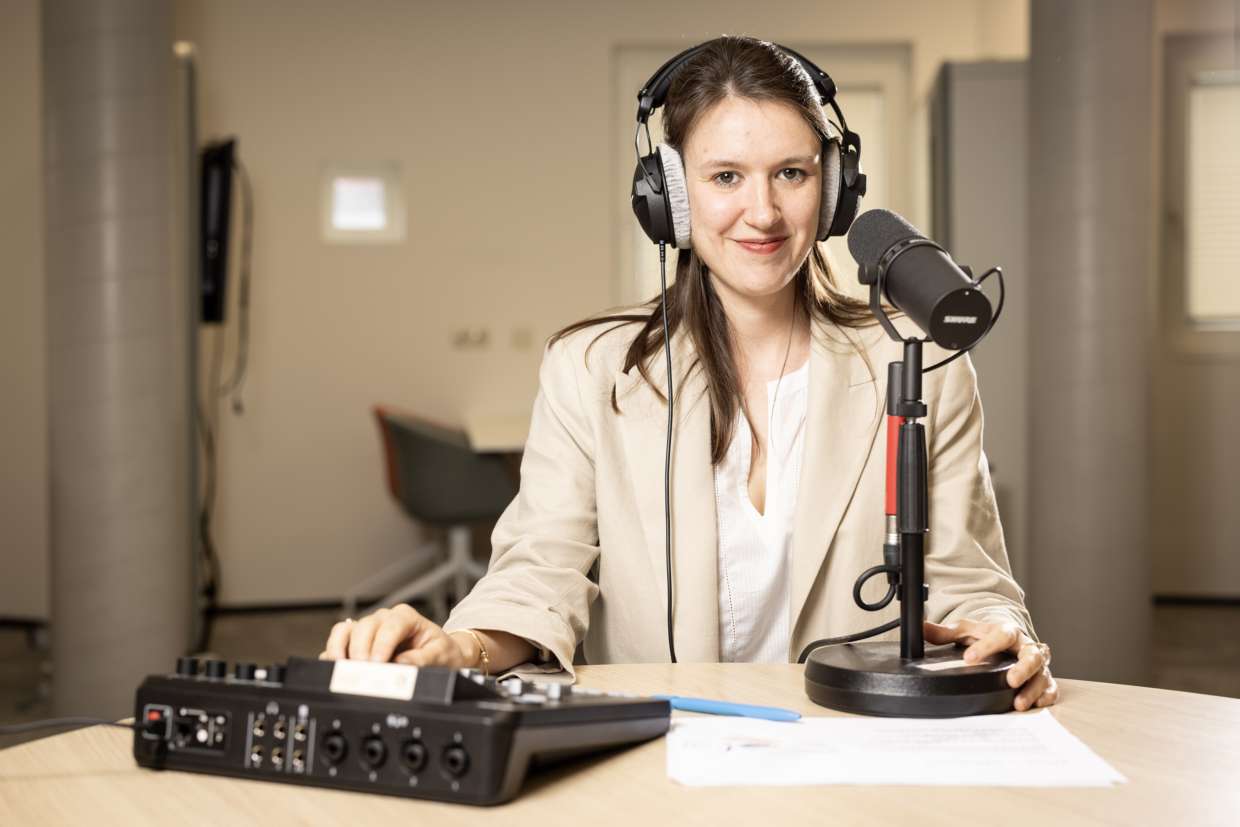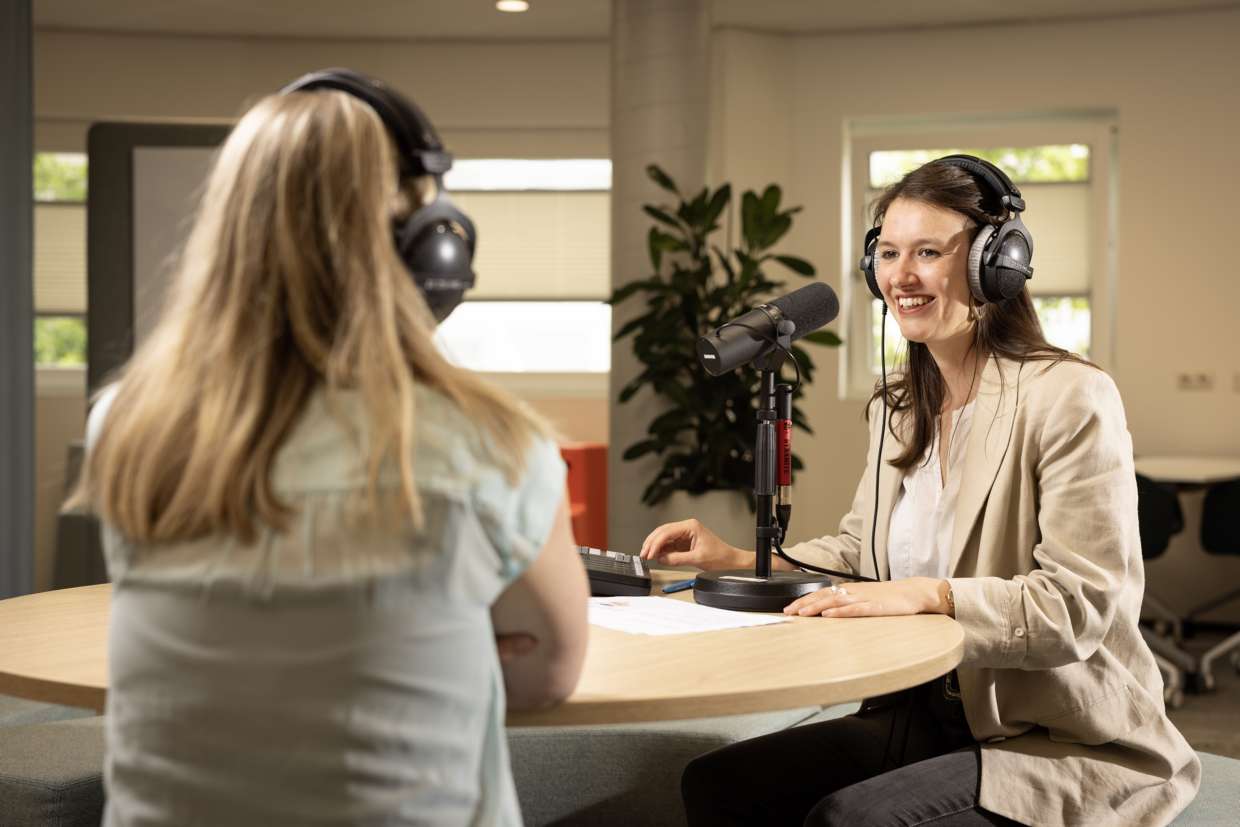In today's rapidly changing educational landscape, integrating technology has become a key element of modern teaching. One particularly innovative approach that's gaining popularity at UT, is having students create their own podcasts as an assignment. This article explores the experiences of two UT pioneers, who have successfully incorporated podcasting into their curricula.
Meet the innovators
Our first innovator is Mark Tempelman, lecturer in Communication Science and responsible for the module ‘COM@work’, which was designed to give students more insight into their skills and interests, the field of communication science and the typical jobs that students fulfill after their studies. A variety of interactive and reflective learning activities lead to the final product of this module: a podcast about the student’s vision on the field of communication science. Mark sees podcasts as a dynamic format that offers a fresh alternative to presentations and essays. His inspiration to let student groups record their own podcasts came from his own experience as a podcast listener: “I came up with the idea because I heard a few podcasts about the future of work related to AI. Then I thought, why don't we do that?”.
Our second innovator is Lara Wöhler, who is an Assistant Professor in the Multidisciplinary Water Management group, part of the Civil Engineering and Management department. Lara has been developing and teaching a course called Integrated Water Management, where her goal is to cover interdisciplinary topics, not addressed by other master courses. While Lara is also a podcast listener herself, she did not think of using it within the context of her own course until she learned about the availability of podcasting equipment at UT. This was during a lunch session for teachers, organized by ET’s e-learning specialists. Lara specifically appreciates the potential of podcasts to translate complex scientific topics into content that is accessible to a general audience: “so that all friends and family can understand what you’re talking about”.
Student reactions
Both Lara and Mark decided to have the students work in pairs or small groups. Lara observed that the reactions were mixed at first, with some Integrated Water Management students excited and others skeptical. Lara: “I decided to record an intro, to be used by all students at the beginning of the podcasts. It was a bit of a fun introduction. So I think the students thought, if she's doing it, then we can also do that.” As the students engaged with the process, they appreciated the opportunity to develop new skills and present their work creatively. “I remember one group, during the podcast they were discussing building a dam around the North Sea, and they said, imagine there's the blue and red marbles and then more and more blue come out and red come in and red go out. It's only audio, no visual. So what can students actually visualize or describe?”
Mark noted that students especially value the interactive and fun aspect of the assignment. The podcast component received high evaluations, and students valued the chance to reflect on their learning and future careers in a new format.
Practical aspects
According to both Mark en Lara, from a listener’s perspective, sound quality matters. However, during the first run of the COM@work module in 2023, the UT podcast studio had not yet been established. But with the help of Martin Bosker, video & multimedia specialist at UT, Mark was able to set up a temporary studio in the Cubicus building. Somewhere during 2024, both Mark and Lara were able to direct their students to the permanent podcast studio in the Spiegel room 207.
In both courses, Martin Bosker provided support by organizing tutorials to prepare the student groups. Mark: “He dragged all equipment to the Waaier 3, set it up and explained the students how to write a script, how to record, how to post-process. Students were surprised: are we really going to do this?” Next to organizing tutorials, Mark emphasizes the importance of facilitating practice sessions for each student group.
Assessing the podcasts
To assess the podcasts, Lara used a rubric and conducted peer reviews, with students grading each other’s work. The rubric includes elements like creativity, clarity, and the ability to communicate complex topics in simple terms. “In the end, it’s a bit of a subjective taste. So I don't want to be the only one assessing, especially when it comes to not just subject content.” Peer feedback accounted for 25% of the grade, while Lara’s evaluation made up 75%.
In the case of COM@work, students receive a grade for their podcast script and for the final product. Each podcast is assessed by a group of module teachers, which focus on the creativity, content presentation, and audio quality. Mark: “Compare it to the listener ratings on Spotify. We didn’t want to go into the subject content in more depth, we already do that with the essay.” The podcast assignment counts for 40% of the grade, the other 60% is determined by a written essay.
Overall, both teachers were positive about the amount of time it took to adopt podcasting in their courses. Mark: “The module is a big time investment, but the podcasting part on it’s own is not. I didn’t expect that, last year when we first did that. I expected a lot more problems with the equipment, but it remains quite self-explanatory and intuitive.” Lara: “Maybe because it was the first time, it took me a bit longer [to give feedback]. I’m planning to do it for next year as well because of a good experience.”
Final result
In both cases, after the recordings were assessed, all individual students were asked for their consent to publish the podcast by filling in a form. Subsequently, the podcasts (of the groups who gave their permission) were uploaded to a suitable hosting platform:
Integrated Water Management: https://open.spotify.com/show/6ytqInUIsTW3999Py9ixzz?si=a3e374935ac44ecf
Communication Science: https://comatwork23024.transistor.fm/
Want to get started yourself?
The do-it-yourself podcast studio can be booked through the Service Portal. If you are a first-time user, it is possible to ask for an intake meeting during the booking process (highly recommended).
Several useful webinars have been made on podcasts in higher education, such as “De kracht van podcasts in het onderwijs” (by SURF, in Dutch).









